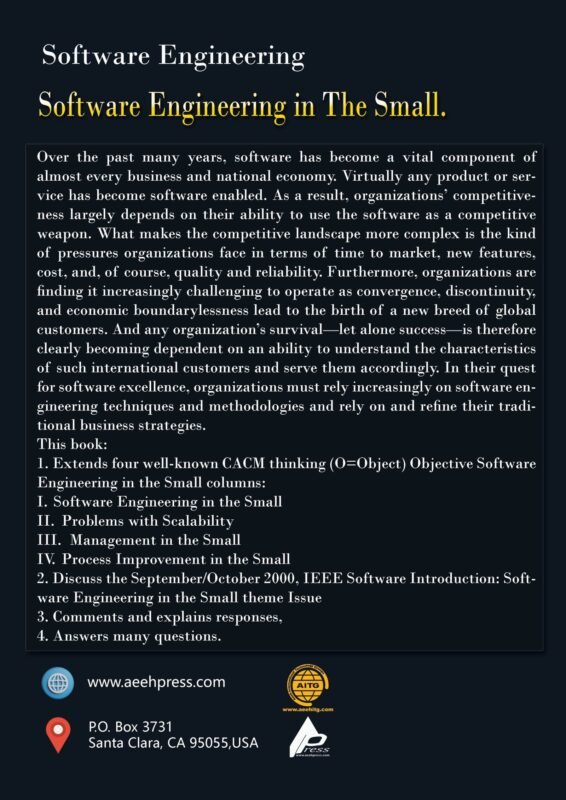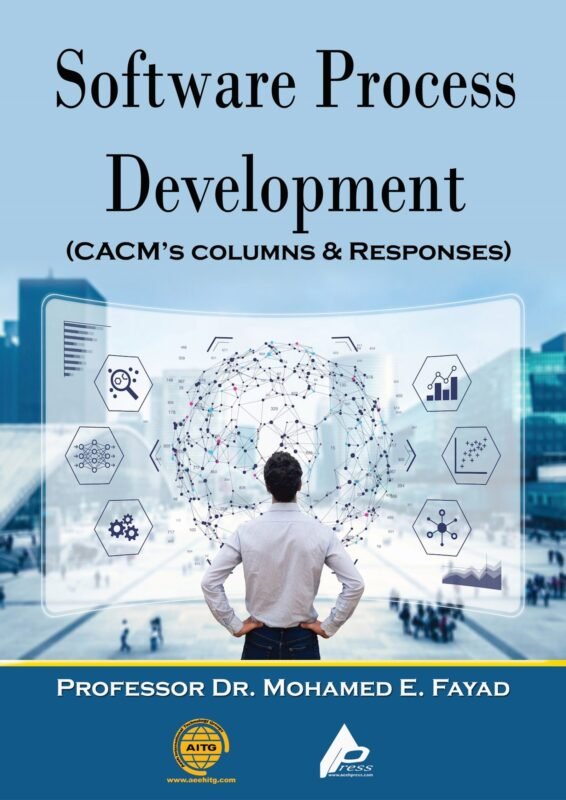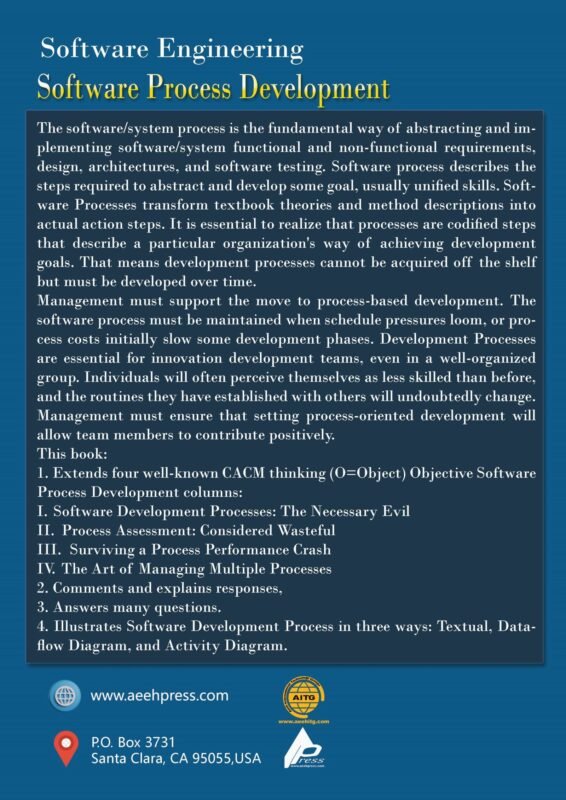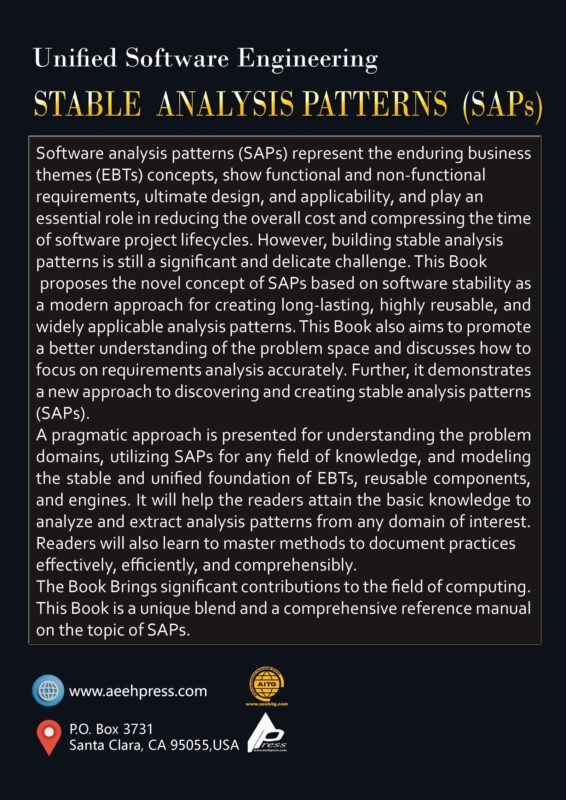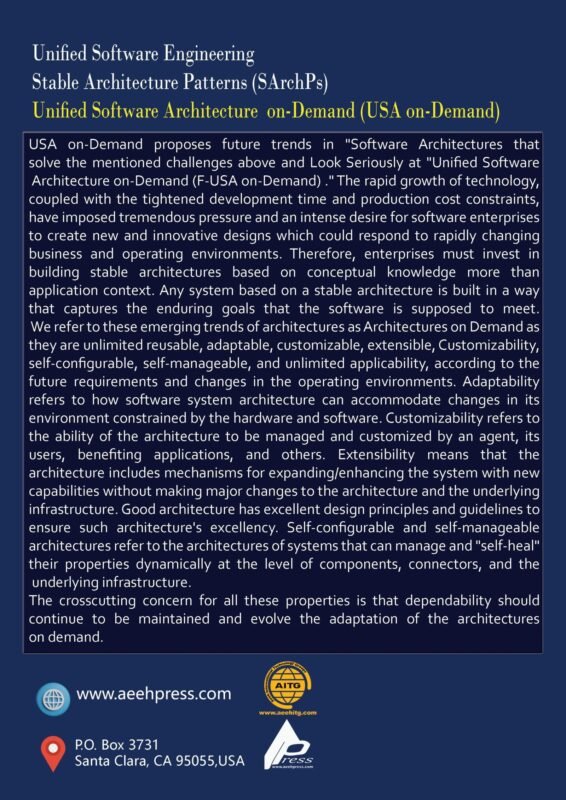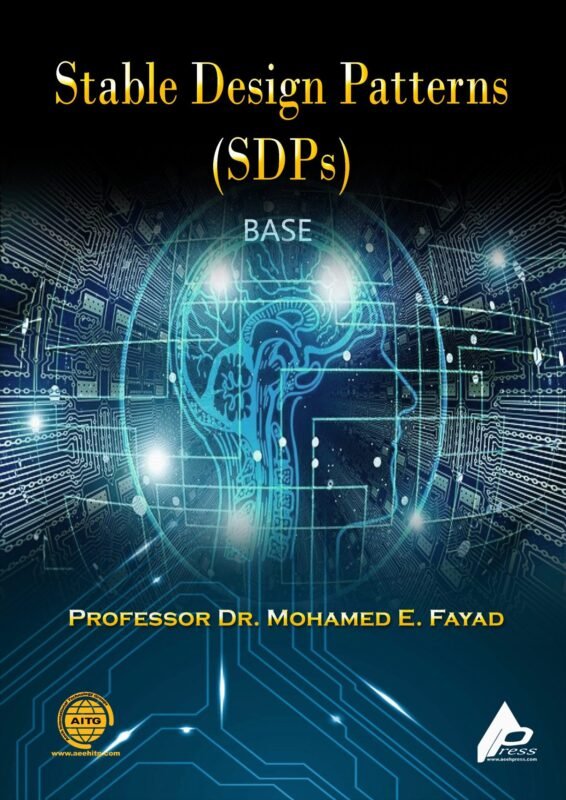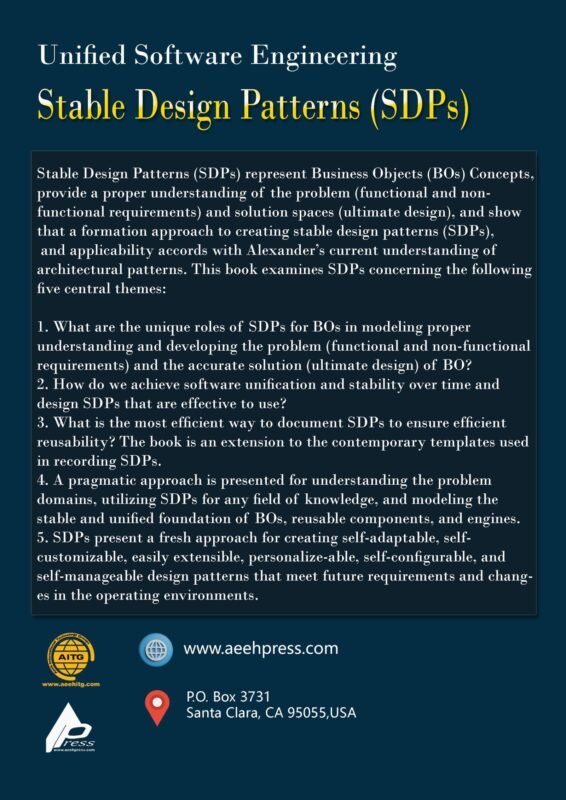Books and writings of Dr. Mohamad Fayad
Knowledge Map Unified Domain Analysis (KM-UDA) (BASE)
$99.99 – $9,000.00Price range: $99.99 through $9,000.00
Galileo Galilei said, "All truths are easy to understand once they are discovered; the point is to discover them." Knowledge Map (KM) discovers all the truths about any domain. The existing domain analysis techniques and domain experts are very good at identifying the tangible aspects of any discipline that considers the applications aspect of the analyzed field. Knowledge Map Unified Domain Analysis (KM-UDA) forms the basis, core, and strong and unified foundation to understand any domain problem and its solution patterns. KM-UDA can create reusable and stable pattern languages and their analysis, design, and architectural patterns. KM's main idea is to allow practitioners and developers to master the particular discipline of interest through accurate domain analysis using KMs, via stable patterns and an insightful methodological process. It gives practitioners and developers the necessary means and tools for a complete retrospective of the stable patterns pertinent to a discipline of particular interest and the tidbits of advice on how to use them to satisfy specific needs. This book delineates a new creative process and provides an understanding of the knowledge map for domain analysis based on the fundamental concepts of unification and stability.
Select options
This product has multiple variants. The options may be chosen on the product page
Our California government and its institutions neither Listen nor Care by Dr. M.E. Fayad
$7.59 – $15.99Price range: $7.59 through $15.99
For several years, I have been trying hard to ward off collective injustice in my arena the injustice of many people and institutions, which is countless. I found no one to help me except God, Lord of the worlds. So I told myself to approach the government and its institutions, the judiciary, and lawyers, seeking help from all of them. Here, I present to them my petitions, letters, and valid evidence so that I may find among them someone who will be fair to me and remove the yoke of injustice from me. It cost me great effort, precious time, and much money, in addition to burning my nerves and deteriorating my health. My lack of resources hardly covered my daily living needs or my medical and health requirements, which prompted me to drown in many debts that exhausted me. In addition, they mistreated me when I demanded my legal rights in all my transactions and entitlements as an elderly American citizen with special needs, but no one listened or cared. It is the first volume among more than thirty-five volumes, containing between its covers all the evidence of letters and petitions showing fraud against my person, which had a disastrous effect on my work, my health, and my entire life, and my responses to all of that with irrefutable evidence
Select options
This product has multiple variants. The options may be chosen on the product page
Software Engineering in The Small.
$69.99 – $149.99Price range: $69.99 through $149.99
Over the past many years, software has become a vital component of almost every business and national economy. Virtually any product or service has become software enabled. As a result, organizations’ competitiveness largely depends on their ability to use the software as a competitive weapon. What makes the competitive landscape more complex is the kind of pressures organizations face in terms of time to market, new features, cost, and, of course, quality and reliability. Furthermore, organizations are finding it increasingly challenging to operate as convergence, discontinuity, and economic boundarylessness lead to the birth of a new breed of global customers. And any organization’s survival—let alone success—is therefore clearly becoming dependent on an ability to understand the characteristics of such international customers and serve them accordingly. In their quest for software excellence, organizations must rely increasingly on software engineering techniques and methodologies and rely on and refine their traditional business strategies. This book: 1. Extends four well-known CACM thinking (O=Object) Objective Software Engineering in the Small columns: I. Software Engineering in the Small II. Problems with Scalability III. Management in the Small IV. Process Improvement in the Small 2. Discuss the September/October 2000, IEEE Software Introduction: Software Engineering in the Small theme Issue 3. Comments and explains responses, 4. Answers many questions.
Select options
This product has multiple variants. The options may be chosen on the product page
Software Process Development
$69.99 – $149.99Price range: $69.99 through $149.99
The software/system process is the fundamental way of abstracting and implementing software/system functional and non-functional requirements, design, architectures, and software testing. Software process describes the steps required to abstract and develop some goal, usually unified skills. Software Processes transform textbook theories and method descriptions into actual action steps. It is essential to realize that processes are codified steps that describe a particular organization's way of achieving development goals. That means development processes cannot be acquired off the shelf but must be developed over time. Management must support the move to process-based development. The software process must be maintained when schedule pressures loom, or process costs initially slow some development phases. Development Processes are essential for innovation development teams, even in a well-organized group. Individuals will often perceive themselves as less skilled than before, and the routines they have established with others will undoubtedly change. Management must ensure that setting process-oriented development will allow team members to contribute positively. This book: 1. Extends four well-known CACM thinking (O=Object) Objective Software Process Development columns: I. Software Development Processes: The Necessary Evil II. Process Assessment: Considered Wasteful III. Surviving a Process Performance Crash IV. The Art of Managing Multiple Processes 2. Comments and explains responses, 3. Answers many questions. 4. Illustrates Software Development Process in three ways: Textual, Dataflow Diagram, and Activity Diagram.
Select options
This product has multiple variants. The options may be chosen on the product page
Stable Analysis Patterns (SAPs) (BASE)
$99.99 – $399.99Price range: $99.99 through $399.99
Software analysis patterns (SAPs) represent the enduring business themes (EBTs) concepts, show functional and non-functional requirements, ultimate design, and applicability, and play an essential role in reducing the overall cost and compressing the time of software project lifecycles. However, building stable analysis patterns is still a significant and delicate challenge. This Book proposes the novel concept of SAPs based on software stability as a modern approach for creating long-lasting, highly reusable, and widely applicable analysis patterns. This Book also aims to promote a better understanding of the problem space and discusses how to focus on requirements analysis accurately. Further, it demonstrates a new approach to discovering and creating stable analysis patterns (SAPs). A pragmatic approach is presented for understanding the problem domains, utilizing SAPs for any field of knowledge, and modeling the stable and unified foundation of EBTs, reusable components, and engines. It will help the readers attain the basic knowledge to analyze and extract analysis patterns from any domain of interest. Readers will also learn to master methods to document practices effectively, efficiently, and comprehensibly. The Book Brings significant contributions to the field of computing. This Book is a unique blend and a comprehensive reference manual on the topic of SAPs.
Select options
This product has multiple variants. The options may be chosen on the product page
Stable Architecture Patterns (SArchPs) Unified Software Architecture on-Demand (USA on-Demand)
$139.99 – $499.99Price range: $139.99 through $499.99
USA on-Demand proposes future trends in "Software Architectures that solve the mentioned challenges above and Look Seriously at "Unified Software Architecture on-Demand (F-USA on-Demand) ." The rapid growth of technology, coupled with the tightened development time and production cost constraints, have imposed tremendous pressure and an intense desire for software enterprises to create new and innovative designs which could respond to rapidly changing business and operating environments. Therefore, enterprises must invest in building stable architectures based on conceptual knowledge more than application context. Any system based on a stable architecture is built in a way that captures the enduring goals that the software is supposed to meet. We refer to these emerging trends of architectures as Architectures on Demand as they are unlimited reusable, adaptable, customizable, extensible, Customizability, self-configurable, self-manageable, and unlimited applicability, according to the future requirements and changes in the operating environments. Adaptability refers to how software system architecture can accommodate changes in its environment constrained by the hardware and software. Customizability refers to the ability of the architecture to be managed and customized by an agent, its users, benefiting applications, and others. Extensibility means that the architecture includes mechanisms for expanding/enhancing the system with new capabilities without making major changes to the architecture and the underlying infrastructure. Good architecture has excellent design principles and guidelines to ensure such architecture's excellency. Self-configurable and self-manageable architectures refer to the architectures of systems that can manage and "self-heal" their properties dynamically at the level of components, connectors, and the underlying infrastructure. The crosscutting concern for all these properties is that dependability should continue to be maintained and evolve the adaptation of the architectures on demand.
Select options
This product has multiple variants. The options may be chosen on the product page
Stable Design Patterns (SDPs)(BASE)
$99.99 – $399.99Price range: $99.99 through $399.99
Stable Design Patterns (SDPs) represent Business Objects (BOs) Concepts, provide a proper understanding of the problem (functional and non- functional requirements) and solution spaces (ultimate design), and show that a formation approach to creating stable design patterns (SDPs), and applicability accords with Alexander’s current understanding of architectural patterns. This book examines SDPs concerning the following five central themes: 1. What are the unique roles of SDPs for BOs in modeling proper understanding and developing the problem (functional and non-functional requirements) and the accurate solution (ultimate design) of BO? 2. How do we achieve software unification and stability over time and design SDPs that are effective to use? 3. What is the most efficient way to document SDPs to ensure efficient reusability? The book is an extension to the contemporary templates used in recording SDPs. 4. A pragmatic approach is presented for understanding the problem domains, utilizing SDPs for any field of knowledge, and modeling the stable and unified foundation of BOs, reusable components, and engines. 5. SDPs present a fresh approach for creating self-adaptable, self- customizable, easily extensible, personalize-able, self-configurable, and self-manageable design patterns that meet future requirements and changes in the operating environments.
Select options
This product has multiple variants. The options may be chosen on the product page
The Brutality of Tyrants – First Volume by Dr. M.E. Fayad,
$8.59 – $18.99Price range: $8.59 through $18.99
In The Brutality of Tyrants, Dr. Mohamed Fayad recounts his journey through systemic injustice, racism, and corruption that profoundly impacted both his personal and professional life. His story extends beyond individual experiences, revealing public issues affecting millions of American citizens today. Dr. Fayad’s experiences within academia, healthcare, and financial institutions illustrate how individuals and systems have not only marginalized him but continue to suppress countless others. Facing deliberate negligence, exclusion, and even threats to his life, Dr. Fayad’s narrative highlights the devastating impact of institutional oppression on everyday citizens. This book is not intended to offend any person, institution, group, political party, government, or country. Rather, it is Dr. Fayad’s means of reporting his own experiences, with the hope that recounting these injustices will prevent them from happening to others. His account critiques the failure of justice in America, particularly for marginalized individuals, and underscores the urgent need for reforms across multiple sectors within the nation. The Brutality of Tyrants serves as both a personal memoir and a broader critique of institutional oppression, issuing a strong call for accountability and change in what Dr. Fayad describes as one of the greatest nations on Earth. Through his narrative, he urges readers to confront the corruption and inequality that persist in America, hoping to inspire a collective push toward a fairer, more transparent system for all.
Select options
This product has multiple variants. The options may be chosen on the product page






